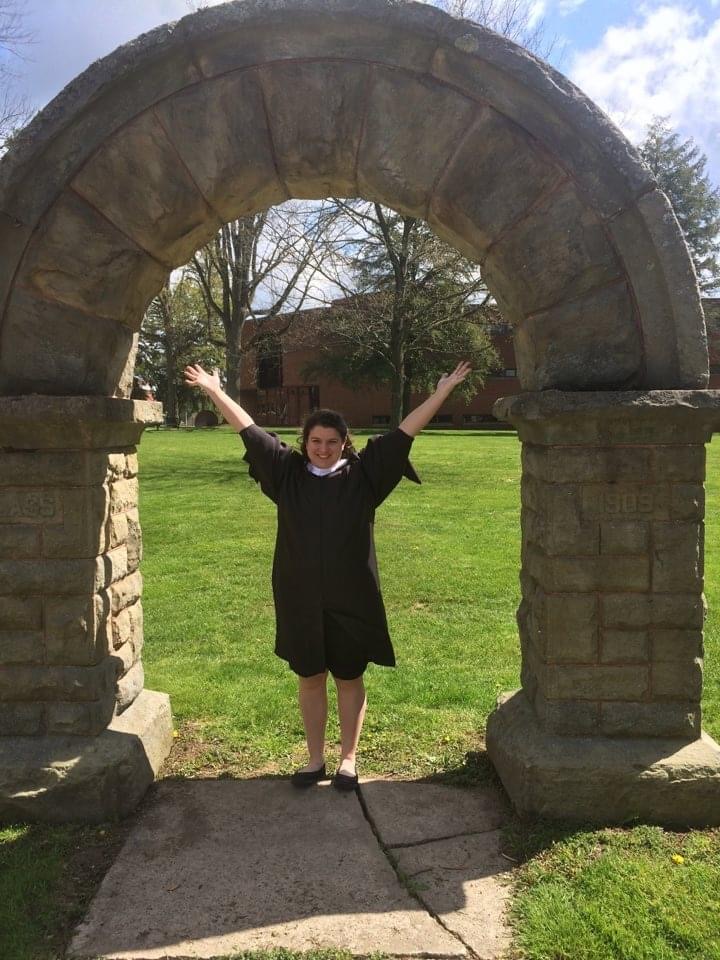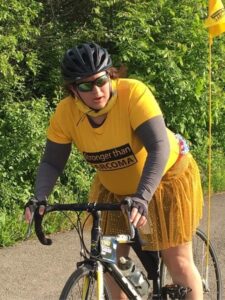By Tara Ruggiero, LSN Program Coordinator

While checking for ticks during an eight-day, back-country canoe trip in Northern Ontario with her dad, celebrating the completion of graduate school, Sarah Hunt discovered something unexpected: a lump deep in her upper arm. She didn’t panic. Assuming it was just a cyst, she made a mental note to mention it at her next doctor’s appointment. A lifelong athlete and synchronized skater who had represented Canada on the world stage, Sarah was used to her body working hard and working well. Cancer was the last thing on her mind.
At age 29, the lump didn’t go away. After several delays, multiple ultrasounds, an MRI, and the lump growth from the size of a pea to a 3-inch tumor, Sarah finally received her diagnosis: myxoid liposarcoma. This is a rare and aggressive soft tissue cancer, even rarer in the nerve bundle of the upper arm where hers was located. It was the day before her 30th birthday.
A New Reality
“I thought you did the treatments and then life went back to normal,” Sarah recalls, “but I was kind of wrong.”
Sarah underwent 25 rounds of radiation, followed by surgery to remove the tumor and then a second surgery to deal with “I didn’t know what was ahead. I just knew I had to keep moving.” healing complications. The radiation helped shrink the tumor to make surgery feasible, but also caused lasting damage: nerve pain, reduced mobility, and dystonia, a condition that requires regular Botox injections to manage painful spasms in her arm. Despite these challenges, Sarah considers herself a survivor, not because the cancer is gone, but because she continues to live fully and intentionally.
“I remember at a Young Adult Cancer Canada conference, they said ‘you’re a survivor from the moment you survive hearing you have cancer’ and that stuck with me, ” Sarah shared.
The Hardest Part No One Talks About
About a year after treatment ended, Sarah hit an unexpected low.
“When you’re in survival mode, you don’t have time to feel. But when the dust settles, that’s when it hits you. ” Her mental health became a major hurdle. “I felt isolated. No one around me had liposarcoma. I didn’t know what was normal or what to expect. And no one warned me that this mental crash was coming.”
It wasn’t until she attended a patient conference and heard others share similar experiences that she began to feel less alone.
Reclaiming Purpose Through Action
Determined not to let cancer define her, Sarah decided to take part in Canada’s Ride to Conquer Cancer, a 200+ km cycling event to raise funds for cancer research. Her dad had once said they couldn’t do it because they didn’t “have a story.”
From that hospital bed, she turned to him and said, “Do you think we have a story now?”
They registered on the spot.
Six months later, Sarah completed the ride, covering 220km (~137 miles) in two days. Over the years, she and her family have raised over $130,000 for sarcoma research.
 Finding Her Voice as an Advocate
Finding Her Voice as an Advocate
During COVID, Sarah discovered another calling: advocacy. She became involved with the Terry Fox Foundation in Canada—particularly meaningful to her since Terry Fox also battled sarcoma.
She trained at the Health eMatters conference by Myeloma Canada learning how to engage with government, the media, and the public. She even returned to the program as a keynote speaker.
“I don’t think getting cancer was ‘for a reason,’” Sarah said, “but I do believe no one else should have to go through it alone. That’s why I speak up. That’s why I share.”
Where She Is Now
Today, Sarah runs her own speech-language pathology practice and continues her advocacy work nationally. She’s eight years post-surgery and still deals with ongoing effects of treatment, including nerve pain and limited use of her arm. But she’s also thriving; professionally, personally, and a support for others walking the same uncertain path.
Sarah’s Advice to New Liposarcoma Patients:
- Breathe. “Don’t panic. You’ve already survived hearing the words – start there.”
- Talk to your medical team. “The internet doesn’t always help with rare cancers like liposarcoma. Your doctors will.”
- Don’t go at it alone. “Find a support group. Advocate for one if it doesn’t exist.”
- Watch for the crash. “Mental health struggles can hit hard when treatment ends. Be ready and get support.”
~ Sometimes it is the struggle that reveals just how strong we truly are.~
